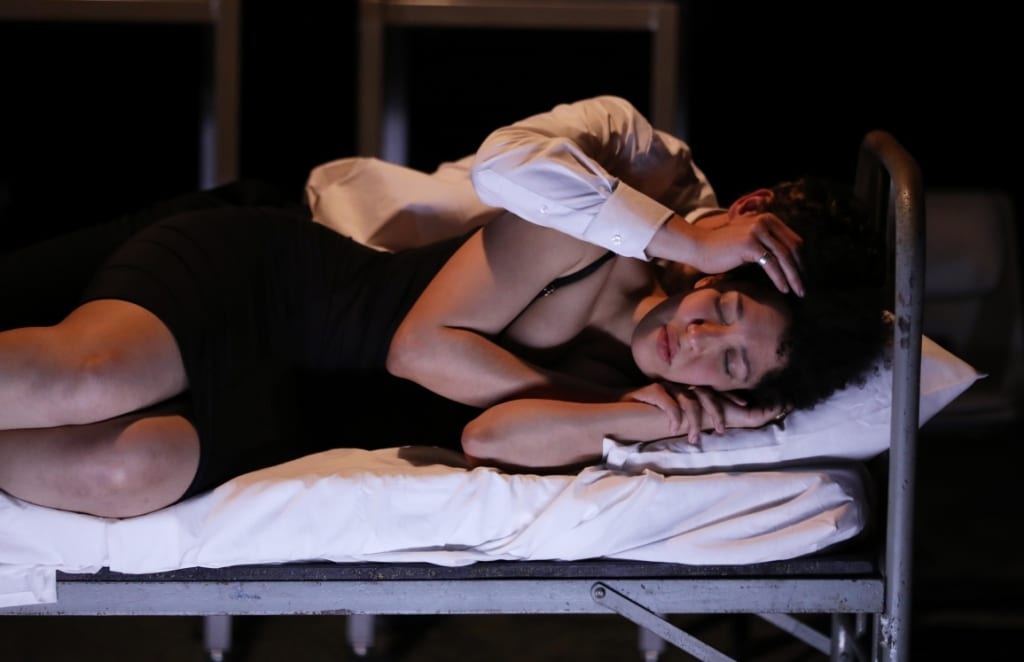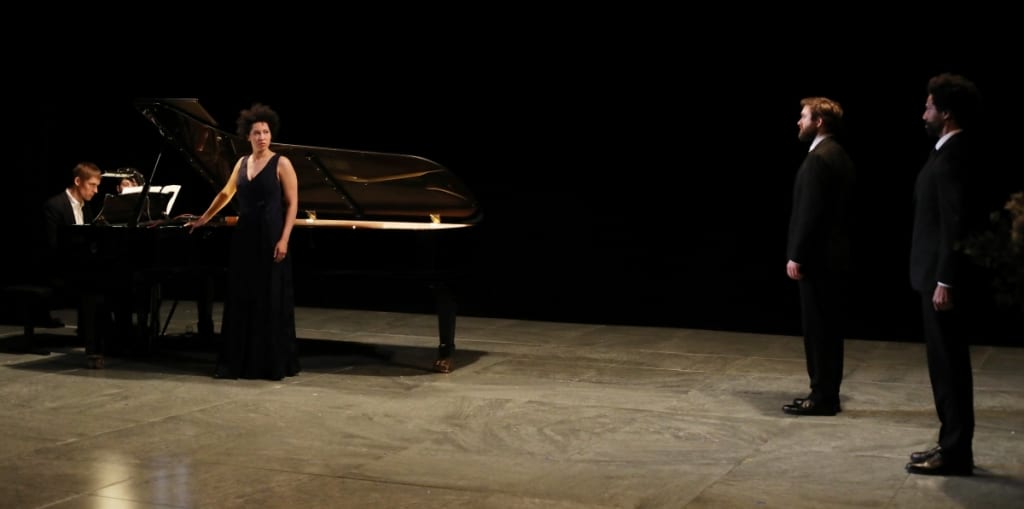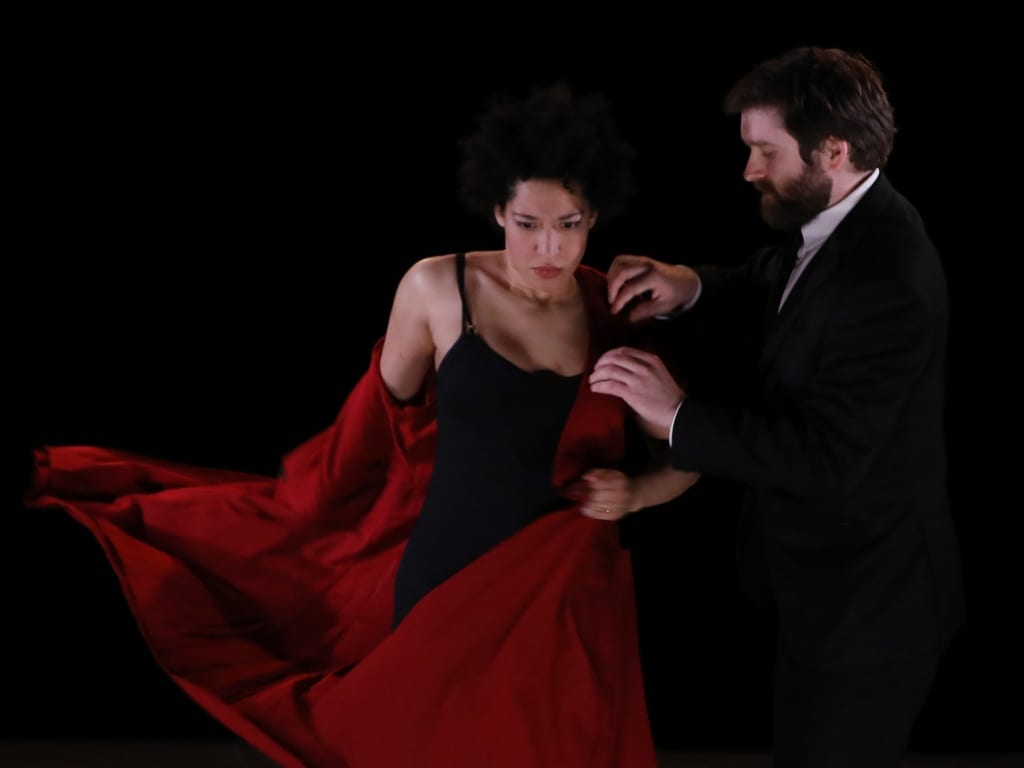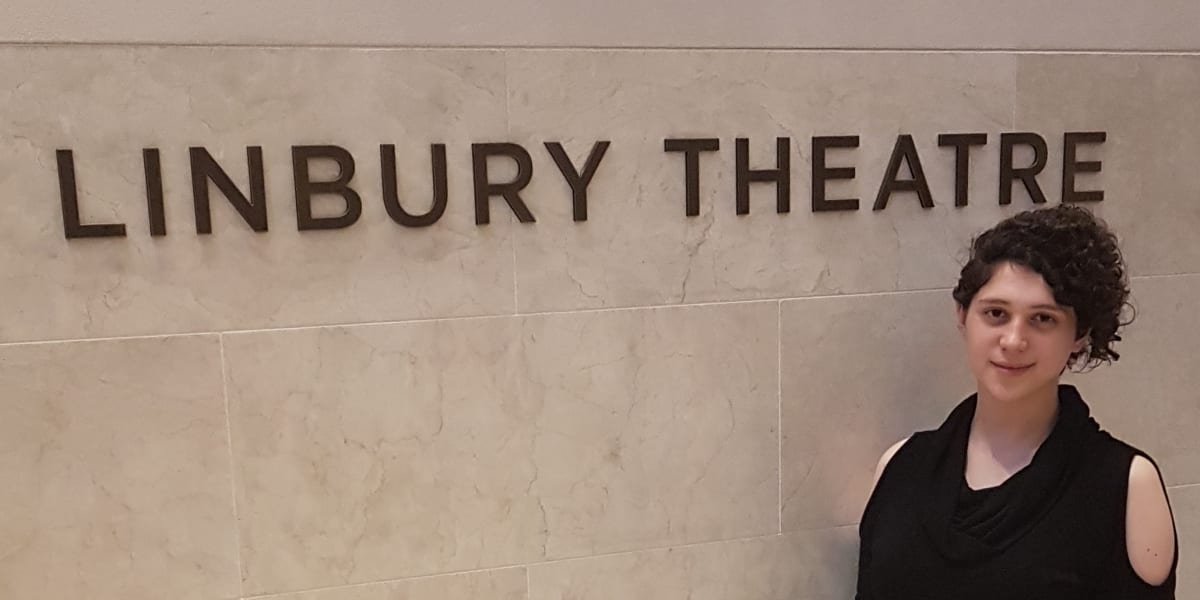At the age of just 25, Natasha Kafka is performing at the Royal Opera House at the Linbury Theatre in Zuberland (Magic Land) as part of the four actors ensemble. This co-production was first staged in Paris, and from London it travels through Europe and then to New York.
Natasha Kafka is an actress with musical training – proficiency of level 8 in piano, violin and viola and to a lesser degree other musical instruments. She studied at Mountview Academy of Theatre Arts in Peckham, London, where she gained a BA Hons in Performance (Actor, Musician).
We met at the Royal Opera House’s café. Her youthful face wore a warm spontaneous smile. I was intrigued by her surname and wondered if she is related to the famous writer, Franz Kafka?
‘Well, I’d like to say yes. I’m related, Franz Kafka because my grandfather’s name was Franz Kafka, and he came from Czechoslovakia’. Her grandfather escaped from Czechoslovakia in 1939. He never liked talking about that period, so she is not clear about details, save that some members of the family were not so fortunate to escape from German-occupied Czechoslovakia during World War II. Her Jewish ancestors reached the shores of Britain, as refugees. Her maternal ancestors arrived in the UK in 1900, following pogroms in Russia. In the paternal branch of the family ‘music is something that’s very much celebrated and family members play a musical instrument, to varying degrees’ Natasha adds that her great-great aunt was a prominent pianist and many more excellent musicians came from that side of the family.
How does a young actress land up performing at the Royal Opera House?
Initially, auditioning for Katie Mitchell, the director, was the sole driving factor ‘I jumped at the opportunity even before I found out what really the project was’ she said with a broad smile. Natasha has been interested in Mitchell’s work since her students’ days. She finds Mitchell’s style and what she does in theatre inspirational. ‘She challenges taboo subjects and pushes boundaries even within sort of techniques of theatre’. So, when I found out Mitchell is directing, I really wanted to jump on board with it. Natasha is adamant that her experience of working with Mitchell exceeded all her expectations. Katie Mitchell’s openness to suggestions and ideas, her talent at putting the actors at ease from the outset, without making them fear a mistake, seems to be one of the keys to Mitchell’s reputation. ‘I felt really able to give a hundred per cent in the room’. Mitchell explores the text with her actors: ‘let’s try this idea out and let’s do this and see what happens if… you feel like you’re really part of a team rather than a soldier whom the high officer tells what to do. I never heard her raise her voice or shout, she is an empowering and encouraging director’.
Natasha is not shy to compare the current experience with what she has had with some other directors who come along with a fixed idea and style or those who make you scared lest you make a mistake or those who expect that ‘everything’s got to be a hundred per cent all the time’.
Zuberland – The Magic Land
Broadly speaking, this piece is a marriage between a composition by the English playwright, Martin Crimp, and the Belgian composer Bernard Foccroulle, who have created 16 new songs, that include quotations from the Song of Songs (Old Testament), and 6th century AD Arabic poem Mâlik Asma of Fazâra, and which are performed alongside Robert Schumann and Heinrich Heine’s Dichterliebe (The Love of the Poet). This is an attempt to open up a dramatic dialogue between the nineteenth century and today, and between Europe and its Eastern Mediterranean origins. Dreams of a magic land of peace and nightmares of her bombed city intertwine.

Natasha, with great enthusiasm, explains that Zauberland’s narrative explores the past and present experiences of a pregnant opera singer, fleeing the war zone in Aleppo, Syria, hoping to cross over to Zauberland – a magical land of peace and security. She is haunted by her recent past and images of the ravaged city that she was forced to leave behind. She settles in Cologne, where she can rebuild her career as an opera singer, and where her daughter is born. On the eve of her husband’s death, she has a strange dream in which she is singing Schumann’s song cycle ‘Dichterliebe’.
The protagonist is the soprano Julia Bullock accompanied on the piano by Cédric Tiberghien, who dramatize the protagonist’s journey in a 90 minute-long opera performance. To evoke the emotions and experiences, Mitchell uses an ensemble of four actors, three males (Ben Clifford, David Rawlins, Raphael Zari) one female, Natasha Kafka. Each assumes more than one role in the course of the performance – security officers, policemen, train conductors, guards and the female member, Natasha is a bride and a daughter. In between her parts she gets to sit next to the pianist, turn his pages and be an onlooker.
‘We really get to dive into her character, how she feels and how she experiences the situations she is in her dreams and thoughts,’ Natasha explains.

The three men provide constant movement on stage, busying themselves around the protagonist, undressing and putting on her black ceremonial dresses or daily dresses. All this creates dramatic tension and may be read as metaphors of women’s conditions in war zones and post-war.
Natasha points out that this is the first show that she does not have any lines. How does it feel not to have to memorize any lines, but concentrate on your movements in relation to the central character, who has to tell her story through her singing?
Natasha smiles ‘A couple of days before rehearsals even began, I thought it’s great. I’ll just do whatever they ask me but half a day into rehearsals, I was like, oh my goodness, oh my goodness. I’d rather have lines. I thought it would be a walk in a park, but far from it. This is so amazing, but it was so confusing, in the sense that I felt my voice was taken away from me’ she explains ‘your journey around the stage becomes your script and as a character I found it to be quite empowering but it was quite terrifying at the beginning. It is so different from anything I’ve done before’.
‘I’ve found my character through my interactions with others. I think we do see the protagonist’s internal story comes to life because we dive into her past and future. The other three males characters are faceless beings that shake her and sort of pull her around’ Natasha adds that those gestures and movements, in conjunction with the singer’s response, expose her emotions and turmoil. ‘There are some beautiful moments. My favourite part is when I’m playing her daughter; it’s one of the very few moments you get to see her enjoy that reality. These are quite touching moments between mother and daughter’.

Talking about her acting career, it is clear Natasha loves her profession and admits that often it is not straight sailing but requires hard work and perseverance.
This summer Natasha performed in Oliver Bennett’s Europe After the Rain, directed by Cara Nolan. Bennett’s production was also to do with refugees. ‘It was just a small cast of four actors and we told this brilliant story very politically – relevant to Brexit and immigration within the country and the impact of that; so it was a snap-shot of life offering four very different responses to the current affairs of England at the moment. I played a girl called Martha, 14 years old who was born in the UK; but her mother was a refugee from Eastern Europe, and it was a matter of navigating life whether seen as immigrants or as UK citizens and how that determined how they were treated.’
Having refugees as her ancestors, Natasha admits that although she considers herself British, yet as a British Jew, she knows her heritage is from a multitude of countries. Each grandparent came to England on their own journey, and each part of her family made their way here through different wars or disruptions. ‘I do think about it a lot. I feel very strongly about my family’s heritage, but then I also feel strongly towards my British heritage also, and creating these characters really makes you kind of realize the fragility of nationality and citizenship.’
Apart from doing more Shakespeare, she would love to act in a film or a TV series. She is not fussy; she just needs the opportunity and she knows she can do it.

